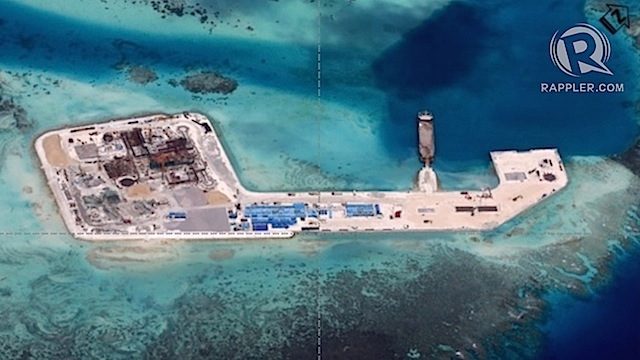SUMMARY
This is AI generated summarization, which may have errors. For context, always refer to the full article.

MANILA, Philippines – The Philippines is not the only country worried about recent moves of China, specifically in their method of reclaiming disputed territories.
On Thursday, April 16, amid reports of newly released satellite images revealing China’s artificially expansion of a reef in disputed waters – resumably to strengthen its territorial claims – Communications Secretary Herminio Coloma Jr said the concern expressed by the Philippines is shared by other nations. (READ: PH mulls citing China reclamation in historic case)
“We and other countries, as well as the United States, are expressing concern regarding this and we’re calling the attention of China regarding their activities. We aren’t the only ones keeping an eye out, nor just the countries with maritime entitlements,” he said.
“Many other countries are expressing concern. And in the field of foreign affairs and diplomacy, having many voices is one way of showing the position of the majority.”
Coloma’s statement comes after President Benigno Aquino III told Agence France-Presse in an interview on Tuesday, April 14, that China’s actions in the South China Sea “should engender fear for the rest of the world.” (READ: PH cites ‘growing int’l concern’ over China reclamation)
He added, “The question of it escalating to something beyond everybody’s control should be at the top of the minds of all world leaders.”
In March 2014, the Philippines raised its territorial dispute with China before an international arbitral tribunal. The Philippines had filed diplomatic protests against China in the past, but China continues to ignore these notes and to assert its claim on the South China Sea.
Clear rules needed
Coloma also said he feels that past statements by US President Barack Obama have ashed light on the “direction of US foreign policy here in the Asia Pacific.”
“He had statements to the effect that that China should not bully smaller countries in the region and specifically naming the Philippines and Vietnam,” Coloma said referring to Obama.
In his visit to the country in April last year, Obama was not categorical in saying it would defend the Philippines against China if push comes to shove, but said the US is “very supportive of President Benigno’s approach to go before the tribunal for the law of the sea, and to seek international arbitration that can resolve this in a diplomatic fashion.”
Aquino is scheduled to attend the 26th ASEAN Summit for heads of state on April 26 to 28 in Kuala Lumpur and Langkawi, where he is also expected to continue pushing for a stronger stance against China.
Asked whether China would be discussed at the Summit, Coloma only said past ASEAN summits have discussed the urgency of creating a legally binding Code of Conduct for Parties in the South China Sea.
He said the Department of Foreign Affairs has yet to announce the exact agenda of the Summit, but conceded that China “is always a topic with high level of interest and priority assigned by the ASEAN member countries to it.”
Coloma said that despite its seemingly failed attempts to deter China, the Philippines would continue to use a rules-based approach in dealing with the regional superpower.
He did however emphasize the necessity to create regulations regarding the conduct of parties involved in maritime claims, a problem that was present as early as 2002.
“Because there are no clear rules, this is what creates threat and danger,” he said.
He added: “President Aquino always emphasizes the importance of the South China Sea because a huge part of international trade passes through here. It does not only involve members of ASEAN, but the many countries in the world that allow the passage of their products through the South China Sea or West Philippine Sea, which is why freedom of navigation and regional peace and stability are important.” – Rappler.com
Add a comment
How does this make you feel?
There are no comments yet. Add your comment to start the conversation.